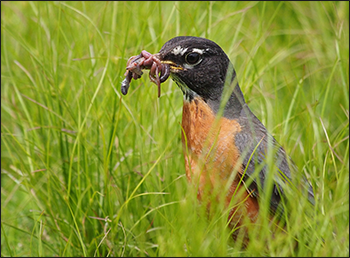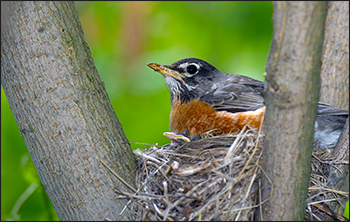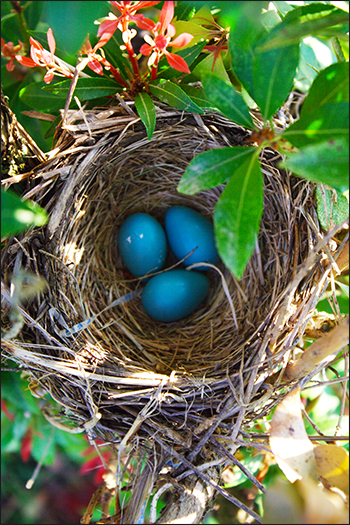This past summer, I was walking to work through a nearby park. It was very early in the morning and I could see the first rays of sunlight peeking over the eastern ridge. I began to feel the warmth of those sun rays as I walked. Yes, another beautiful summer day was unfolding, and it was being greeted by a chorus of singing birds.
My eye followed the sound of the birds’ songs, and I could see several nests in the tree above me. I notice one particular bird peering down at me from her hideaway. I don’t know what prompted this, but I said “hello” to the bird. To my great surprise, she answered me, and began what would turn out to be an amazing conversation.
“I am an American robin,” she said with pride.
“I will spend this day sitting in my nest, incubating three eggs —- my third brood this summer!” she exclaimed. “I can do this because my male robin friend forages food for me, but later I’ll go out foraging myself.”
“I’ll need to sit here on these eggs for 12 to 14 days,” she continued, “but once they hatch, they’ll be able to fly in 14 to 16 days.”
My new friend paused for a moment, and then told me some more about her newest additions.
“When these chicks hatch they will be naked,” she said, “and their eyes will stay closed for the first few days.”
“I’ll brood them constantly while they are young, but soon I’ll only need to brood them at night or during bad weather.”
“I’ll finally have a chance to get out and stretch my wings, when I take on my next role as flight instructor and mentor,” she mused.
“Oh, my brood will have so much to learn about what to eat and what not to eat,” she worried, “and about predators who are always ready to make a meal of robin chicks.”
Turning wistful for a moment, my friend described for me what the future would hold for her family.
“After they leave the nest, my young ones will only stay by me a short time begging me for food,” she sighed.
“They grow up so fast! They’ll hatch, and then two weeks later they’ll be able to fly as long and as far as I can.”
“That’s when we’ll part ways and they’ll begin living their separate lives,” she said, unable to hide a note of melancholy in her voice.
All of a sudden a shudder wracked her little body from beak to tail. As she resettle her feathers and composed herself, she quickly changed the topic of our conversation.
“I must tell you that we robins consider ourselves to be quite clever,” she opined.
“We engineer elaborate nests with twigs, roots, long course grass, loose string, feathers, and pieces of discarded paper —- and inside we always add an extra layer of mud.”
Horrified by her next thought she gasped, “We NEVER build a nest on the ground!”
“We always build in the crotch of a tree or on a building ledge. It’s just so much safer!”
“You see, we robins are not cavity nesters,” she explained, “and as a general rule, we don’t like bird houses.”
“But we often take advantage of artificial nesting platforms that humans provide for us.”
Puffing herself up, she began to brag.
“All in all, I am rather proud to be a robin,” she gushed.
“Like our human friends, I think we are quite industrious, and quite aware of our surroundings.”
“Haven’t you ever seen one of us stand tall, beak to the sky, surveying everything around?” she asked.
I told her that I certainly had seen robins standing alert on my own lawn.
With that our conversation started to wander here and there until the sun had climbed higher in the sky.
Neither one of us had eaten breakfast yet, so our thoughts began to stray to our rumbling bellies. Worms aside, I remembered that I knew little about robins liked to eat. Anticipating my next question, she asked one of her own.
“Did you know that robins form large flocks in the fall and winter?”
Not waiting for my response she said, “We do that so we can gather in trees to roost and eat berries.”


An American robin (Turdus migratorius) feeding on earthworms. Credit: Flickr.com/photos/taylar (Ingrid Taylar)
“Speaking of food,” she continued, “have you ever seen robins running and stopping, and running and stopping across your lawn?”
Answering in the affirmative, I asked her why robins did this.
“Well,” she said, “when the weather warms, we robins like to forage on the ground for worms and such.”
“You know, right after they hatch, I’ll start feeding worms and other soft-bodied prey to my chicks right away,” she added conspiratorially.
“First, I’ll spy out my prey, and then I’ll pounce and pull it up from the soil.”
“I’ll use my ears and my eyes to find food,” she said, “but my vision’s really the best for hunting.”
“When you see me and my robin friends scampering around your lawn, that’s when we’re listening for earthworms,” she said.
“When we take a few short hops and then bob our heads left, right or forward, that’s when we’re using our eyes to detect the movement that tell us when food is nearby.”
Waxing sentimental about her foraging days, she continued my education.
“We robins really like to gather together and hunt on freshly mowed lawn, or where humans have their sprinklers,” she said.
“We also love foraging the freshly turned earth in your gardens where worms and grubs are abundant.”
Abruptly, my little friend clapped her beak shut and raised her head to look over my shoulder. I turned and saw a black-and-white form crouching in the underbrush not far away. It was a CAT!
“Here’s trouble!” the robin squawked.
Heart hammering in her chest, she choked out her worst fear.
“Ha-hawks, and, and sq-squirrels, and r-raptors, li-like, like owls, and large s-s-snakes prey on r-robins, e-especially on ch-chicks and r-r-robin eggs,” she stammered.
As quick as I could, I shooed the cat away from the tree and the nest. Thoroughly rebuffed, the feline bounded across the lawn and disappeared into some far-off bushes.
I turned back to my robin friend and tried to soothe her nerves. I told her that no other predators would get that close as long as I was around.
Wits collected and tummy settled back onto her clutch, she found her way back to our conversation.
“We robins must remain vigilant and do our foraging in flocks,” she said sounding grave.
“That way we can watch over one another and quickly react to danger.”
“Adult robins, like me, will sound an alarm call,” she continued, “and we’ll even “dive bomb” predators that get too close to young birds.”
“I’ve heard that only 25% of young robins survive their first year of life,” she said as a tremor of fear shook itself up from her throat.
“I’ve also heard that the average life span of my kind is only about two years.”
“I’ve been lucky so far,” she added bleakly.
As if to break my little friend’s dark mood, the sound of birdsong drifted in on the breeze. I turned again to find my robin’s mate and his friends foraging for their next meal out on the park lawn. As the smile spread across my face, she asked the most rhetorical of questions.
“My mate and his friends sing lovely songs, don’t they?”
“We robins sing long and complex songs,” she continued.
“Lots of times we like to repeat individual phrases, and then string them all together with brief pauses in between.”
A hint of pride returned to her voice as she remarked, “We’ll vary the style of our tunes depending on the time of day, and believe it or not, the songs that my distant cousins sing in other parts of the country sound just a little bit different from the ones we sing here.”
Charmed by her candor, I picked up this new thread in our conversation.
I told my friend that I had heard once that robins were among the first songbirds to sing at dawn, and that they were some of the last to stop singing at dusk.
“We do more than sing!” she blurted.
“We also communicate specific messages to each other using a number of calls and other vocalizations.”
“That’s particularly true when predators like that awful cat are slinking about,” she added with defiance.
“Even during mating season, when we’re all being competitive and territorial, we’ll call a group together and drive those scoundrels off!”
As if on cue, the big tuxedo cat poked her head out of the shrubs once again. She was sizing up my friend’s mate as he pulled a grub up from the lawn. Then, quick as lightening, she made her move!
Some other members of the robin flock stood alert in the tree overhead. As the cat darted toward her target, the watch standers above shrieked their alarm. In a cacophony of fluttering wings and frantic chirping, my friend’s mate and all of his kin shot into the air and out of harm’s way.
Stunned by the narrow escape, the nesting robin took a gasping breath.
“That was close!” she panted.
“If you don’t mind, I think I need a bit of a rest after all of this morning’s excitement.”
Sympathetic to her plight, I looked down at my watch and realized that I was late for work. I quickly thanked the robin and told her that I would check in again on my way home.
She bid me a fond farewell, saying that she looked forward to my next visit.
As I turned to leave, I saw that troublesome cat scrabble over the park fence and into a nearby yard. I had no doubt she was off in search of easier meal than these nimble, watchful robins.
* * *
Portions of this article were written and edited by Steve Reynolds.


I’ll take “things that never happened” for 200, Alex…